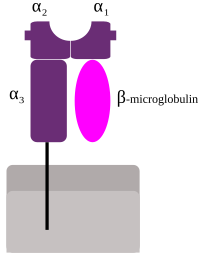
Photo from wikipedia
BACKGROUND Major barriers in using classical FOXP3+ regulatory T cells (Tregs) in clinical practice are their low numbers in the circulation, the lack of specific cell surface markers for efficient… Click to show full abstract
BACKGROUND Major barriers in using classical FOXP3+ regulatory T cells (Tregs) in clinical practice are their low numbers in the circulation, the lack of specific cell surface markers for efficient purification and the loss of expression of Treg signature molecules and suppressive function after in vitro expansion or in a pro-inflammatory microenviroment. A surface molecule with potent immunosuppressive function is the human leukocyte antigen-G (HLA-G), which is normally expressed in placenta protecting the "semi-allogeneic" fetus from maternal immune attack. Because HLA-G expression is strongly regulated by methylation, we asked whether hypomethylating agents (HA) may be used in vitro to induce HLA-G expression on conventional T cells and convert them to Tregs. METHODS Human peripheral blood T cells were exposed to azacytidine/decitabine and analyzed for HLA-G expression and their in vitro suppressor properties. RESULTS HA treatment induces de novo expression of HLA-G on T cells through hypomethylation of the HLA-G proximal promoter. The HA-induced CD4+HLA-Gpos T cells are FOXP3 negative and have potent in vitro suppression function, which is dependent to a large extent, but not exclusively, on the HLA-G molecule. Converted HLA-Gpos suppressors retain their suppressor function in the presence of tumor necrosis factor (TNF) and preserve hypomethylated the HLA-G promoter for at least 2 days after azacytidine exposure. Decitabine-treated T cells suppressed ex vivo the proliferation of T cells isolated from patients suffering from graft-versus-host disease (GVHD). DISCUSSION We propose, in vitro generation of HLA-G-expressing T cells through pharmacological hypomethylation as a simple, Good Manufacturing Practice (GMP)-compatible and efficient strategy to produce a stable Treg subset of a defined phenotype that can be easily purified for adoptive immunotherapy.
Journal Title: Cytotherapy
Year Published: 2017
Link to full text (if available)
Share on Social Media: Sign Up to like & get
recommendations!